Pam Lecky's Blog, page 15
November 11, 2021
The Telegram – a Short Story for Armistice Day
Ireland, 1914
Bill Ryan was my eldest brother. He was a popular lad with a ready smile, always up for mischief. At twelve years of age, I looked up to him and adored him, as did my younger brother David and little George who was only three. Our universe was a tiny part of County Meath; our world a small farmstead handed down for generations. Mother worked hard and although she was strict, she was a loving and kind-hearted woman. My father, however, was a hard man. Often aloof, his stern gaze was enough to put the fear of God into you.
When Bill finally plucked up the courage to broach the subject of signing-up, he met with strong resistance. But he persevered. We must defeat the Hun, he said to them, his voice resonating with conviction. As David and I listened from behind the door, my heart sang. How brave he was! But father refused to listen – Bill was needed on the farm and that was the end of the nonsense. Mother pleaded with Bill as only a mother can. But in the end, he presented them with a fait accompli, arriving home one day in uniform.
His cheery words on departure didn’t fool me; I saw the fear in the depths of his hazel eyes. But he had always been stubborn, my brother, and as proud as all the Ryan men before him. As he disappeared down the narrow laneway, it bewildered me. Why did he have to go, I wondered, and not someone else’s brother? He was only eighteen. One last wave and he turned towards the road. The rest of us returned to the house but mother stood still, despite the chill of the early morning, and watched until the twist in the laneway took him out of sight.
For the first few months after he left, Bill’s letters had arrived from the Curragh training camp almost every week. Ironically, father read them out to us, his voice ringing proud. Mother sat white-faced and said not a word, her knitting needles clicking furiously. Even when one letter contained a photograph of Bill in uniform, she could not look at it without her eyes welling up.
But one Saturday morning the dreaded news arrived; Bill’s regiment was off to France. My mother gasped, her hand to her throat. My father glared at her and shook his head. She made for the stairs, her shoulders rigid as if she feared she would splinter into tiny pieces. I watched my father’s face. Would he follow her? But he carefully folded the letter and put it away with the others in the drawer of the dresser. He would not meet my eye but hauled on his heavy coat and slapped his flat cap on his head, his expression grim. I sat at the table, uncertain. Come along, Joe, he said standing in the doorway, there’s work to be done. His attitude confused me because I could hear my mother’s sobs. Why did he not comfort her? David looked at me, the same question in his eyes. Father tapped impatiently on the door frame then grunted. What was I supposed to do? Torn, I could only shrug at David and follow my father out the door.
A year passed and life continued as normal on the farm, but I look back on the winter of 1915, its horrors crystal clear in my mind. I knew the world was at war. What boy in Ireland, or indeed the world, did not? The wireless spoke of little else. Every night, my father would turn it on and sit, head bent, listening to the news. Belgium, France and names of places I had never heard before, tripped off the announcer’s tongue. Marnes. Ypres. Neuve Chapelle. We had no atlas in the house. I pestered my father to explain where these places were. He would shake his head and tell me to ask the schoolmaster in the morning. It was only years later I realised he hadn’t known either. Soon those far-flung places were a part of my vocabulary.
October slid into November and winter’s icy tentacles stole under the door and through the cracks in the ancient window frames, chilling us to the bone. Night-time was the worst. I snuggled up to George in the narrow bed against the wall in the attic, but it made no difference. We shivered in unison under the thin wool blanket. Not that I slept much. Between the scratchy blanket and my anxious thoughts, sleep was elusive. Where was Bill? What was he doing? Each morning we awoke to frost on the bed cover and ice on the inside of the windows. At my mother’s bidding, I broke through the plug of ice in the bucket of water and helped George wash his hands and face. Father grumbled it was the foulest winter he had ever known.
Off to school with you, my mother would say, pushing us older boys out the door each morning. It wasn’t too bad once you got over the initial blast of frigid air, but we had wanted snow not this crackling hoar-frost that made your ears and nose hurt and your eyes water. I had found Bill’s old woollen hat out in the barn and commandeered it. My younger brother David wanted it too and we fought like cats for it. It was worth the thrashing I received from my father when he saw David’s black eye, for that hat smelt of Bill’s tobacco and gave me comfort.
Once in France, Bill’s letters became less frequent and mother’s knitting became more frantic. She used her egg money to pay for the postage on the parcels she sent to him. As she stood at the kitchen table, carefully wrapping the knitted items in brown paper, my father would watch in silence, his expression sour. I wondered if he begrudged Bill those things or was it the expense of the postage. However, I was proud she entrusted me with the trip into town to the post office. Mr O’Connor always smiled at me and ruffled my hair. You’re a good brother, young Joe, he’d say. He always gave me a peppermint cream from one of the glass jars on the shelf behind the counter.
No one believed it was possible the winter could become any colder. But it did. December was soon upon us and with it came the snow storms. The laneway to our house was deep with snow. It was so bad we did not go to school. Each of us dreaded when it was our turn to bring the bucket out to the barn to fill it with turf. Our chilblains and sniffles were nothing compared to what the boys were suffering in the trenches in France, my mother would say. I tried to imagine what it must be like and prayed every night that God would keep Bill safe. Wouldn’t the best Christmas present be him coming home for a few days? But I didn’t dare voice this as I knew my mother was frantic with worry; the permanent frown on her forehead testament to her inner turmoil.
Bill had been absent so long now I was finding it hard to remember his face or the sound of his voice. This distressed me; it felt like betrayal. When it became unbearable, I’d sneak up to the attic and hold his hat in my hands and try hard to remember. I’d picture happier times, mucking about in the fields or proudly working by his side at harvest time. It helped a little.
Whenever there was a break in the weather, I trudged to the post office, mother’s parcel tucked under my arm. God forgive me, but all I thought of was that peppermint cream. Two weeks passed and no letters came, then three. My mother anxiously waited for my return and scanned my hands as I’d come in the door. No post, young man, she’d ask, her voice cracking. Guiltily, I’d shrug and shake my head. I’d slip off to do my chores, uncomfortable to be around her. But dread is contagious. We all fell victim to it as the atmosphere in the house deteriorated. The silence from France continued.
The next week as I entered the post office there was a huddle of people at the counter, deep in conversation. Someone coughed and Mr O’Connor looked over his glasses at me. The customers fell silent. Ah, young Joe, is it, he asked. I thought that was a strange thing to say. Did he not know me well? He shifted on his feet, glancing at the other customers who were still watching me in silence. My stomach flipped over as I wracked my brains. Had I done something wrong? Had someone snitched on us for stealing those apples last autumn?
Mr O’Connor cleared his throat. I put the parcel up on the counter as usual but he didn’t take it. He winced and turned away for a brief moment. Pushing his glasses up the bridge of his nose, he let out a slow breath. Then he handed me a small envelope. Take this telegram to your parents, son, he said at last. I gazed at his Adam’s apple, as it jumped up and down in his throat. I wondered what ailed him. My eyes strayed to the jar on the shelf behind him, but he didn’t take the hint. Disappointed, I knew there would be no treat today and cursed my bad luck. As I closed the door behind me, I heard the customers’ voices rise. I hurried home, out of temper, the telegram rammed into my jacket pocket.
Wimereux, France, 1955
My wife June consulted the map as our hire car slowly rounded the bend in the road. It should be up ahead, she said, tapping the map with a finger. I hadn’t been sure about dragging her along on this trip, but of course I should never have doubted her. My rock.
The little Citroën spluttered as I changed gear, my nerves jangling. Beside me, June stiffened, but I kept my eyes on the road ahead. Driving on the ‘wrong side of the road’ was testing my mettle. I’d already had a run-in with an irate farmer and his tractor. The small town was much like every other we had passed through during the trip. A seaside town, it was off-season now and the streets were almost deserted. With a shaking hand, I wound down the window. The tangy scent of salt-laden air flooded into the car. The sea was close but not visible. I wondered if Bill had liked it here; did he have time to paddle in the water? Silently, I berated myself – of course he didn’t. It was a bloody war!
All of a sudden, I was overcome with dread. What had possessed me to come here? David and George had thought it a strange thing to do. But, their memories of Bill were not as vivid as mine. I ground the gears again and cursed under my breath. Where was this blasted place? I knew my French was far too basic to ask directions. Keep going, June said, when I voiced this thought. What a sensible woman she was – I took a few deep breaths and relaxed.
Around another bend and all of a sudden we came upon it. The cemetery wall was high but you could make out the tops of crosses and monuments. I parked up. For several moments I sat unmoving and concentrated on my breathing. At last I was here. Easing my grip on the steering wheel, I turned to my wife. Do you mind if I do this alone, I asked her. She smiled and nodded.
I paused at the gateway, a trifle confused. This looked like an ordinary French cemetery, not a military one. It was then I realised there was another cemetery directly behind it. Through an archway and a little gate was the War Graves Commission cemetery. It was stark but strangely beautiful with row upon row of flat headstones lying flush with neatly mown lawn. As I walked along counting the rows, I realised my face was wet with tears. So many graves! Had all of these men been Bill’s comrades? But as I stopped and read some of the inscriptions, I realised they were from many different regiments and countries. The only link was where they had died; the field hospital at the edge of the town.
Bill’s grave was right at the back under the shadow of a high wall. I’m not sure how long I stood there as images of the day we learned of his death flooded my mind. My mother had collapsed shaking into a chair when I attempted to hand her the telegram. I had not realised what it was, but she knew immediately. Panicking, I had yelled at David to fetch our father and he almost tripped out the door in his haste. Little George had clung to my mother’s skirts, staring up at her in horror and fear. Father had come bustling in from the barn then stopped dead when he saw my mother struggling to breathe. His chin wobbled and his hand snaked out and snatched the telegram from my hand. Take your brothers to your aunt’s house, he’d said in a strangled voice. I knew it was serious, for he disliked my Aunt Lily intensely.
Forty years have not dulled the pain of that day; it is a watermark engraved on my life’s page.
I caught movement from the corner of my eye and looked up to see June strolling towards me. As our eyes met she hesitated, but I gestured to her it was all right. Thankfully, she didn’t say a word but came up close and smiled her encouragement. I took a deep breath and pulled the woollen hat out of my pocket. It no longer smelled of tobacco. It no longer smelled of Bill.
But I placed it on the headstone and said a silent prayer for my long-lost brother.
The End
©Pam Lecky 2021
October 23, 2021
Horror Zone – Getting Spooky with Pam Lecky, Multi-Genre Writer, and Her Love of The Ghost Story
Pam Lecky, is not only a good friend and fellow author, she also shares my love for the humble ghost story, writing a great, short piece of fiction is quite the art ,and a ghost story always has a little gothic around the edges. Here, Pam discusses one of her own eerie pieces, The Lighthouse Keeper.

Pam is an Irish historical fiction author with Avon Books UK/Harper Collins. She is a member of the Historical Novel Society, The Crime Writers’ Association, and the Society of Authors. She is represented by Thérèse Coen, at the Hardman & Swainson Literary Agency, London. Pam has a particular love of the late Victorian era/early 20th Century.
In November 2020, Pam signed with Avon Books UK/Harper Collins in a two-book deal. The first book in the historical thriller series, Her Secret War, will be published on 14th October 2021; the sequel in 2022.
Her…
View original post 915 more words
October 17, 2021
Her Secret War – Wonderful book news from historical fiction writer Pam Lecky
October 13, 2021
It’s Publication Day for Her Secret War!
I am so thrilled to share the news that my new release is out in the world today. Her Secret War is the first of two books based around a young Irish girl, Sarah Gillespie. Sarah is the only one of her family to survive the North Strand bombing in May 1941 which kills 28 people and leaves hundreds homeless. Her plight resonates with the thousands who survived similar incidences throughout the war, all over the world. From the ruins of her life, Sarah must make some difficult decisions. Like many Irish, she has family in Britain and when they hold out the offer of a new life and a job, Sarah decides to leave Ireland. Unfortunately, her new life slowly falls apart as her family history catches up with her, and she is drawn into the dark world of WW2 espionage.
Both my family and local history inspired Her Secret War. My mother and her sisters left rural Ireland to work in Britain during WW2. One aunt was following her boyfriend who had joined the RAF, and she went to work in a factory making munitions. Another aunt wanted to study nursing, and my mother was a ‘clippie’ (bus conductor) on the Birmingham buses. Her Secret War is not their story, but there are glimpses of their experiences hidden amongst the fiction. The bombing of North Strand, which features in the book, happened only a few miles from where I grew up.
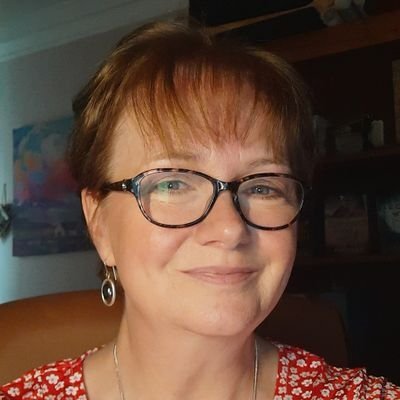 Pam Lecky
Pam LeckyHer Secret War is published by Avon Books UK/Harper Collins today, and the eBook is still only 99p (but not for much longer). You can grab a copy here: http://smarturl.it/HerSecretWar
If you enjoy the book, please leave a review – many thanks!
Here is a short extract from the book:October 8, 2021
New Release from FB Hogan – The Nightmare
I have great pleasure in announcing that Fiona Hogan’s new release is now available. Fiona and I met a few years ago at a bizarre book fair down in Waterford. As survivors of that event, (yes, it was that weird!) we have clung together for support as we have dipped our toes into the publishing world.
Fiona is one very talented writer (and editor) with a wonderful imagination. Her work, however, comes with a word of warning – if you scare easy, be prepared to have to sleep with the lights on for a couple of weeks after reading her short but extremely scary stories!
THE NIGHTMARE – A selection of gothic and contemporary dark fiction from F.B. Hogan
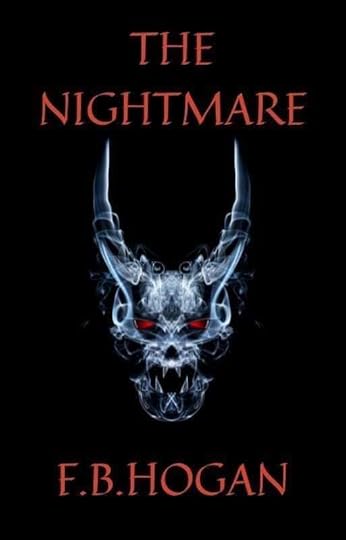 The Nightmare by FB Hogan
The Nightmare by FB HoganI set the table for you, come sit.
I hope you enjoy my humble fare, a selection of only the darkest of delights. But make sure and pull your chair in closer to the hearth for the night falls and the wind blows wild muffling the sound of approaching footsteps. Something comes, something creeps ever closer. A nightmare thing.
Enter a dark place between fact and fiction.
On a cold winter’s night whilst crossing the frost covered field to fetch water, a child hears a sound on the air, an infant’s cry. But no baby awaits her hurried progress.
A pensioner rapidly losing her memory exists in a twilight world where only a lost love can bridge the gap between past and present.
A young man at a boutique music festival discovers more than romance in the fading forest.
Something travels the cosmos, a creature of nightmare and terror. A veiled medium sits at a table in a Victorian parlour waiting.
Amongst the lamb, a wolf harvests souls in a bid for promotion.
Buy Link: The Nightmare
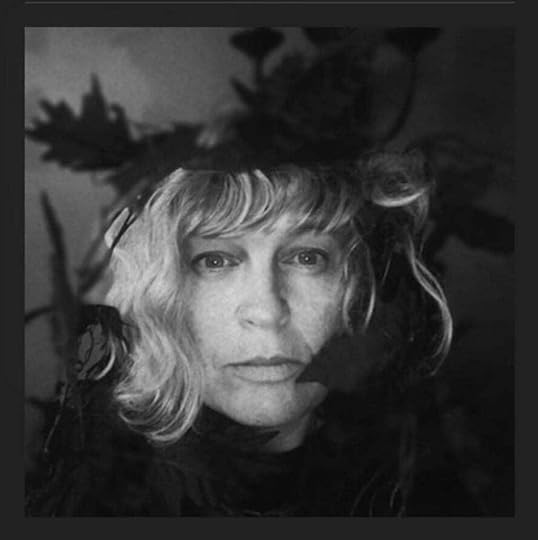 FB HoganA little bit about FB…
FB HoganA little bit about FB…F. B. Hogan is a writer, blogger and poet living in the midlands of Ireland. She masquerades as a sensible adult and mother to five children and a cat but lives and breathes purely for horror. Her collection of dark fiction The Nightmare is now available on Amazon.
Fiona writes in a mix of genres and you can also find her collection of humorous and supernatural tales – The Lights Went Out and Other Stories on Amazon under the name Fiona Cooke Hogan. Her novella, a romantic comedy set in Kerry, Ireland – What Happened in Dingle, is also available to download for Kindle. She scribbles random thoughts about nature, her work and anything that amuses her at her blog http://www.unusualfiction.wordpress.com.
The Lights Went Out and Other Stories
Fiona has recently signed a two book contract with SpellBound Books and her first book, a collection of deliciously dark and twisted tales kicks off SpellBound’s SHOctober Horrorfest.
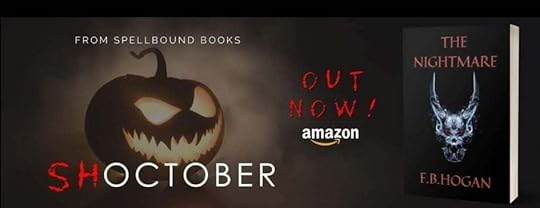
September 18, 2021
New Release from Dianne Ascroft
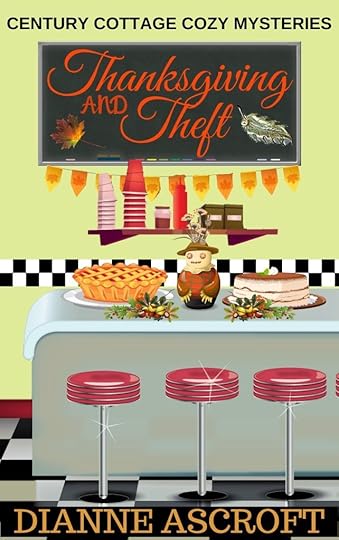
A reunion weekend, a repeated crime, a fresh outcome: Lois Stone heads back to Toronto to visit friends for Thanksgiving weekend. When she interrupts a vicious mugging in the park where her husband was attacked and died, she vows to catch the assailant and return a treasured keepsake to the elderly victim.
Buy Link: https://books2read.com/u/3RJDoL
A little bit about Dianne …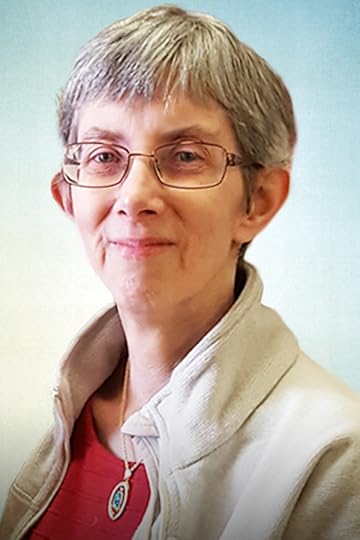
Dianne Ascroft writes the Century Cottage Cozy Mysteries, set in rural Canada, as well as The Yankee Years, an historical fiction series set in WWII Northern Ireland. She has a passion for Ireland and Canada, past and present. An ex-pat Canadian, Dianne lives on a small farm in Fermanagh with her husband and an assortment of strong-willed animals. Online she lurks at https://www.dianneascroft.com.
September 3, 2021
A Conversation with Dominic Fielder
Today in the Library we have Dominic Fielder who has dropped in to say hello and to share some insights into his life as an author.
You are very welcome, Dominic, please introduce yourself: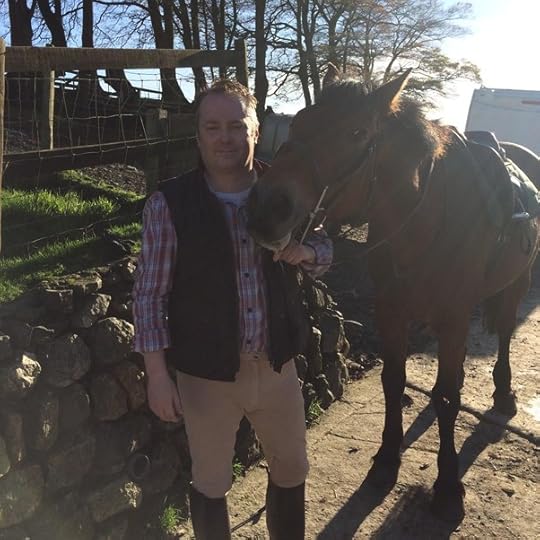
I’ve held a variety of working posts, some I’ve been good at, and others appalling. Before the world of Marvel and DC became popular, I ran a comic book store and worked for my parents’ family book business (which ran for 61 years and only recently closed). Either side of that, I worked in the Banking and Insurance sector, when such jobs seemed glamourous, but really weren’t, and as a telephone sales and alarm services clerk, which never seemed glamourous but allowed me to meet some interesting characters.
I undertook a History degree and after achieving First class honours had a change of direction in life.
For the past ten years, I’ve become a tutor, specialising in Maths and English for students between years 5 and 11 (10 to 16 in old money). During lockdown, I moved my tuition to an on-line delivery whilst training to become a Secondary school Maths teacher. When I’m not doing those things, I try my best to be a reasonable father, and whatever free time is spare from those commitments, I give to writing.
The King’s Germans series that I’m now working on, is a twenty book and twenty plus year commitment. Fingers crossed, I will stay the course.
Which genre do you write in and what draws you to it?My genre is military history, set in the French Revolution and the Napoleonic wars.
One of the earliest memories that I have is of a writing bureau in the hallway of my home. It was an object that fascinated me, with its hidden compartments. Finding things in these was like discovering treasure, even if these were used envelopes or an old stationery book.
One day, in one of the central sections, I found a colour film brochure for Dino de Laurentiis’ film ‘Waterloo’. After that, my parents would frequently find me perched at the bottom of the staircase, gazing at the splendour of the uniforms, even if I couldn’t grasp the words.
It took a while for me to realise that the ‘splendour’ of those times was illusory, but by then I was hooked. When the military fiction series Sharpe came along, I felt as though they had been written just for me and I scoured the bookshelves of WH Smith looking for each new release. I was also fortunate that my family owned a second-hand book stall, so gems were always turning up there too. My hours spent there fuelled my love of reading and that wonder at the craft of story-telling.
I’d love to have that writing bureau now, but it has long since gone the way of all things. The wonder of the Napoleonic age has not left me though, and I hope that I can capture some of that in my stories.
Are you an avid reader? Do you prefer books in your own genre or are you happy to explore others?I am and I will often read outside of my genre. The books that I tend to read inside of the Napoleonic genre tend to be research based. My guilty pleasure is a bit of science fiction but often the joy of reading is to revisit an old friend and I’m quite habitual in reading works for a second or third (or umpteenth) time.
Are you a self-published/traditional or hybrid author?Currently self-published. I’d like to have an agent but I’m not sure that will ever happen.
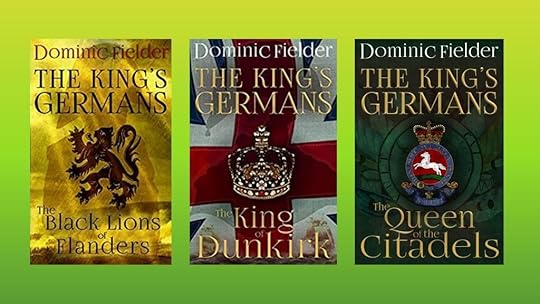 The King’s Germans SeriesWho has been the biggest influence on your writing?
The King’s Germans SeriesWho has been the biggest influence on your writing?Can I be rather cheeky and have three? If so, I’d like to claim Bernard Cornwell’s Sharpe for, well just about everything that has followed on the writing front. But my absolute favourite author and a book I have read and reread before leaving primary school was Alexandre Dumas’ The Three Musketeers. I wont ever have his style or craft but if I can make another person have the same feelings for my work, as I do for Dumas’, that’s not a bad trade. The last is that with each book, I apply the ‘Figures in a Landscape’ test (Barry England). This is a book that pitches you straight into the action. It made me want to read it, and every time I write, I try and set it as my litmus test.
What part of the writing process do you find most difficult? How do you overcome it?Only finding the time to write. I’m a prodigious planner, so I tend to know where a scene is heading. This doesn’t mean that scenes can’t surprise me, they often do. Characters tend to be a little rebellious at times and ideas can spring from the long grass and make you suddenly think…” Hang on, what happens if…”
If you weren’t an author, what would you be up to?I would teach maths, my current day job! It’s a subject that I like to try and make fun and exciting, and to de-mystify.
If a movie was made of one of your books, who would you like to play the lead roles?I’m really rubbish at putting actors to match my characters. If ever it were to happen, I would like it to be a series of relatively unknown French and German actors. I do try and match my characters to people I know or actors from other eras. The photo I have of Erich von Bomm (who is 24 in my books), is of a young Michael York (circa 1973), so you can see why I’m hopelessly dated on modern actors!
If you could live the life of an historical figure for one day, who would you choose and what would you get up to?Wolfgang Amadeus Mozart – I can’t play a musical instrument or converse in a foreign language so to be able to ‘see’ music in the way that he could and then write about it, in either German or Italian, would be beyond incredible.
Please tell us about your latest published work.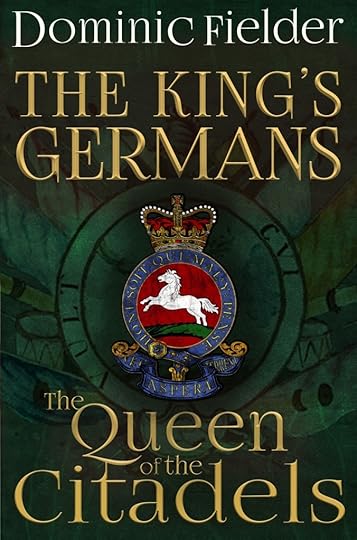
Queen of the Citadels takes place in Flanders during the autumn of 1793 and into the spring of 1794. It tells the stories of a series of characters, principally various ‘German’ soldiers (Hanoverians and Hessians) fighting in the service of George III in the war of the First Coalition against France. The stories are interwoven, and just to make things a little more complicated, there is a thread of French and British stories, so that you are swept along (hopefully) as the decisions taken in London and Paris, play out on the fields of Flanders.
This is a vast canvas, and whilst Sebastian Krombach is the character that most of the stories are written around currently, that might not always be the case. I deliberately avoided naming this series after a person, that merely signals their near immortality. The King’s Germans will see ‘main characters’ die, that’s the nature of war. And this is a story of love, war, revolution, politics, and all points in between. It’s also the third book in the series, The Black Lions of Flanders and the King of Dunkirk being books 1 and 2 respectively.
Whilst there is a degree of explanation of the backstory, reading Black Lions first would make more sense.
I do hope that one day you can make time to discover the series.
Buy Link: https://www.amazon.co.uk/Queen-Citadels-Kings-Germans-Book-ebook/dp/B08X3SS947
If you would like to know more about Dominic and his books please follow the links below:August 20, 2021
New Release from Annie Whitehead
(Release date Sep 15th, on pre-order now): http://mybook.to/TSOF
A father’s legacy can be a blessing or a curse…
AD658: The sons of Penda of Mercia have come of age. Ethelred, the youngest, recalls little of past wars while Wulf is determined to emulate their father, whose quest to avenge his betrayed kinswomen drew him to battle three successive Northumbrian kings.
Ecgfrith of Northumbria is more hostile towards the Mercians than his father was. His sister Ositha, thwarted in her marriage plans, seeks to make her mark in other ways, but can she, when called upon, do her brother’s murderous bidding?
Ethelred finds love with a woman who is not involved in the feud, but fate intervenes. Wulf’s actions against Northumbria mean Ethelred must choose duty over love, until he, like his father before him, has cause to avenge the women closest to him. Battle must once more be joined, but the price of victory will be high.
Can Ethelred stay true to his father’s values, end the feud, keep Mercia free, and find the path back to love?
This is the second of the two-book series, Tale of the Iclingas, which began with Cometh the Hour, but can be read as a standalone.
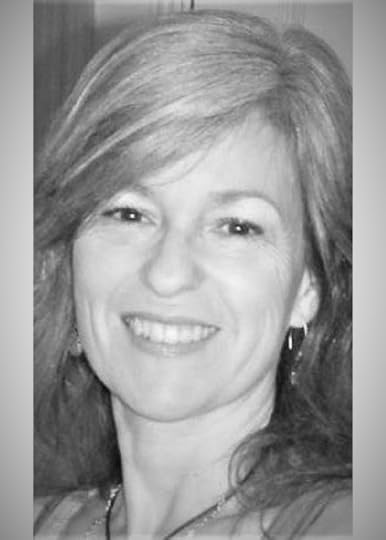 Annie Whitehead
Annie WhiteheadAnnie is a History graduate and an elected member of the Royal Historical Society. She has written four novels set in Anglo-Saxon England, one of which, To Be A Queen, tells the story of Æthelflæd, Lady of the Mercians. She has contributed to fiction and nonfiction anthologies and written for various magazines and is on the EHFA (English Historical Fiction Authors) Editorial team and is senior reviewer at Discovering Diamonds. She was the winner of the inaugural Historical Writers’ Association/Dorothy Dunnett Prize 2017 and is now a judge for that same competition. She has also been a judge for the HNS (Historical Novel Society) Short Story Competition. Her nonfiction books are published by Amberley Books and Pen & Sword Books.
August 3, 2021
New Release from Betty Walker
WARTIME WITH THE CORNISH GIRLS (Avon Books UK)
1941. The Blitz rages over London.
And even in Cornwall, the war is being fought….
When Violet loses her sister in the Blitz, she must take her nieces to safety in Cornwall. On the coast, she meets carefree chorus girl Eva, who is also running from the dangers of London.
But Porthcurno hides a secret military base and soon Violet and Eva realise there’s a battle to fight in Cornwall, too.
Together with local Hazel, who works on the base, they must come together to help the war effort. But will their friendship be enough to keep them safe?
The perfect uplifting wartime listen for fans of Nancy Revell and Donna Douglas.

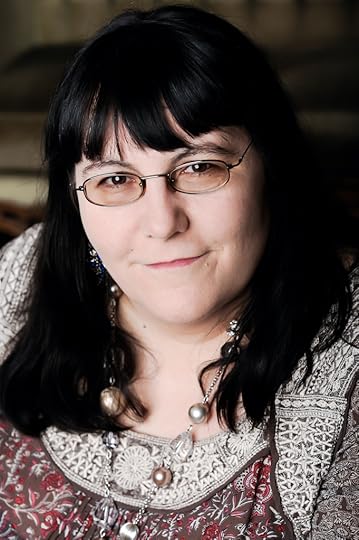 Betty Walker
Betty WalkerBetty Walker lives in Cornwall with her large family, where she enjoys gardening and coastal walks. She loves discovering curious historical facts, and devotes much time to investigating her family tree. She also writes bestselling contemporary thrillers as Jane Holland.
Buy link for Amazon UK (paperback): https://www.amazon.co.uk/Wartime-Cornish-Girls-first-uplifting/dp/0008400288
You can also check out Betty’s social media – just follow the links:
Social Media links:
Twitter – https://twitter.com/CornishGirls
Facebook – https://www.facebook.com/CornishGirlsSagas
July 30, 2021
Going to the Flicks in 1941
Like most young people in the forties, my heroine, Sarah Gillespie, in Her Secret War, is obsessed with cinema and spends all of her hard-earned, but meagre wages, on film tickets and cinema magazines such as Picturegoer Weekly. The world she sees on the silver screen is very different to her life and feeds her dreams. For someone like Sarah, growing up in a working-class part of Dublin, the regular trip to the picture house was pure escapism. During WW2, a third of most Britons went to the cinema at least once a week and it is likely the statistics were similar here in Ireland. My father often spoke of his weekly trips as a child to ‘the flicks’ with his friends, and could tell you all about the various cinemas in Dublin and the types of films they showed. Sadly, most of those cinemas are long gone now.
And then of course, there was the Hollywood glamour filling the pages of the fan magazines, which transported readers far away from the realities of war. Much like the social media influencers of today, the movie stars’ lives influenced popular culture, fashion and music.
In Britain, the fictional trails and tribulations of favourite movie stars on the screen resonated with a public reeling from the Blitz. For a couple of hours, you could forget about the bombs dropping on your neighbourhood, the discomfort of nights spent in an Anderson Shelter or your next bombing run.

So what were the top 3 movies in cinemas in 1941 ?
Citizen Kane: When a reporter is assigned to decipher newspaper magnate Charles Foster Kane’s (Orson Welles) dying words, his investigation gradually reveals the fascinating portrait of a complex man who rose from obscurity to staggering heights. Though Kane’s friend and colleague Jedediah Leland (Joseph Cotten), and his mistress, Susan Alexander (Dorothy Comingore), shed fragments of light on Kane’s life, the reporter fears he may never penetrate the mystery of the elusive man’s final word, “Rosebud.”The Maltese Falcon: In this noir classic, detective Sam Spade (Humphrey Bogart) gets more than he bargained for when he takes a case brought to him by a beautiful but secretive woman (Mary Astor). As soon as Miss Wonderly shows up, trouble follows as Sam’s partner is murdered and Sam is accosted by a man (Peter Lorre) demanding he locate a valuable statuette. Sam, entangled in a dangerous web of crime and intrigue, soon realizes he must find the one thing they all seem to want: the bejeweled Maltese falcon.How Green was my Valley: Huw Morgan (Roddy McDowall), the academically inclined youngest son in a proud family of Welsh coal miners, witnesses the tumultuous events of his young life during a period of rapid social change. At the dawn of the 20th century, a miners’ strike divides the Morgans: the sons demand improvements, and the father (Donald Crisp) doesn’t want to rock the boat. Meanwhile, Huw’s eldest sister, Angharad (Maureen O’Hara), pines for the new village preacher, Mr. Gruffydd (Walter Pidgeon).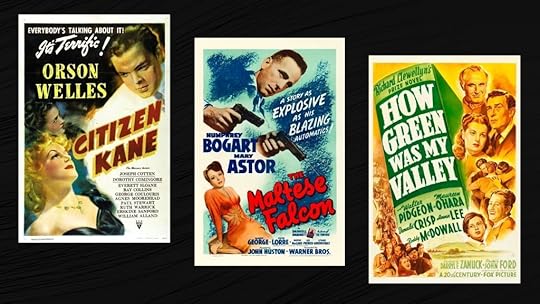 (Source IMBD.com)
(Source IMBD.com)However, for one of the dramatic scenes in the book, which takes place in a cinema, my characters are enjoying Cottage to Let, an English spy film (very apt – if you read the book!), when the sirens sound and the cinema has to be abandoned. The film stars Leslie Banks, Alastair Sim and John Mills and a very young George Cole. Set in World War II Scotland, its plot concerns German spies trying to kidnap an inventor.
The film is available to view on YouTube if you fancy a peek: Cottage to Let
In today’s modern world of TV and streaming services, it is difficult to comprehend the importance that cinema had for public morale during the war. But perhaps we have had a taste of it during the pandemic; let’s be honest – most of us have binge-watched on streaming services or the TV to take our minds off it.
Initially, when war was declared in the UK in 1939, the cinemas were shut. Protest was immediate and within 2 weeks, the order was rescinded. This was in no small part down to objections from the likes of George Bernard Shaw, the Irish playwright, who wrote to The Times, querying the logic of shutting down entertainment.
‘What agent of Chancellor Hitler is it who has suggested that we should all cower in darkness and terror “for the duration”?’
As it transpired, cinemas were an invaluable means of both entertaining and instructing the public, however, it was also a major channel for war propaganda and was used by both the Allies and Nazi Germany to keep the public fired up with nationalism, and supportive of the war.
So, who were the most popular movie stars at the time? I have to admit I have chosen some of my favourites here!
First of all the glamourous ladies …
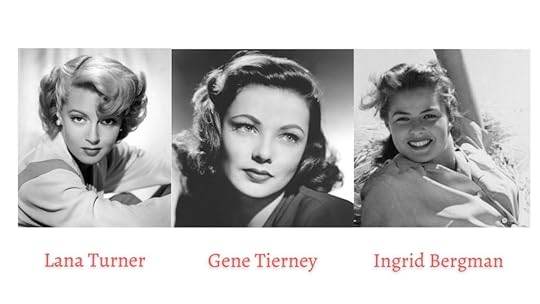
And last, but not least, those suave gentlemen of the silver screen …
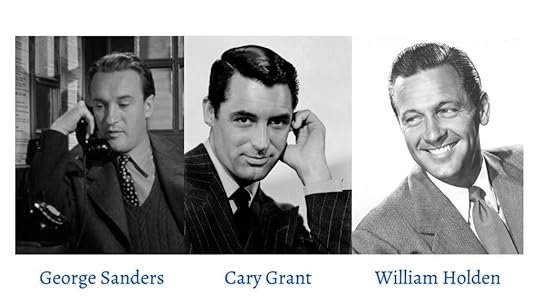
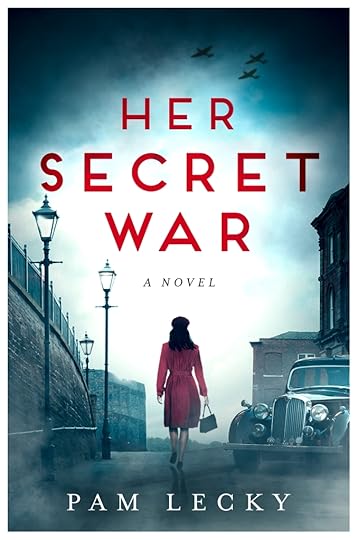
HER SECRET WAR by Pam Lecky
Published by: Avon Books UK/Harper Collins
Release date: 14th October 2021
A life-changing moment
May 1941: German bombs drop on Dublin taking Sarah Gillespie’s family and home. Days later, the man she loves leaves Ireland to enlist.
A heart-breaking choice
With nothing to keep her in Ireland and a burning desire to help the war effort, Sarah seeks refuge with relatives in England. But before long, her father’s dark past threatens to catch up with her.
A dangerous mission
Sarah is asked to prove her loyalty to Britain through a special mission. Her courage could save lives. But it could also come at the cost of her own…
Available to pre-order now: http://smarturl.it/HerSecretWar
A gripping story that explores a deadly tangle of love and espionage in war-torn Britain, perfect for fans of Pam Jenoff, Kate Quinn and Kate Furnivall.




